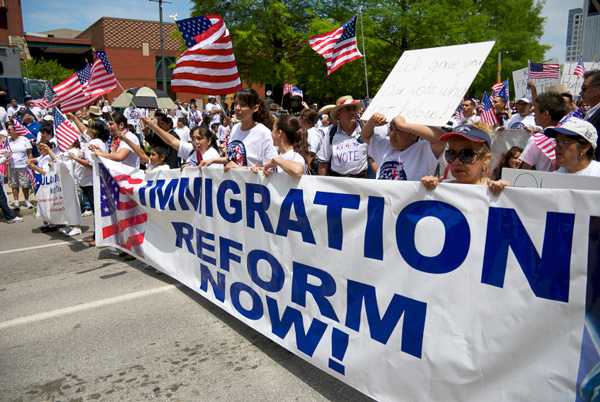What are the Merits of a Merit-Based Immigration System?
In early November 2017, a man drove a truck onto a bike path in New York, killing eight and injuring thirteen. The suspect was a lawful permanent resident who received his immigrant visa through the diversity lottery program. This program allocates fifty thousand immigrant visas for foreign nationals from “countries with historically low rates of immigration to the United States.” Just a month later, in early December 2017, another man attempted a terrorist attack in New York using a homemade pipe bomb, injuring five. This suspect also was a lawful permanent resident, but he received his immigrant visa through the family-based immigrant visa category that allows siblings of U.S. citizens to immigrate to the U.S. based on that relationship.
Although immigration has arguably never left the spotlight in recent years, these two events brought it to the forefront once again. More specifically, President Trump used both instances immediately as an example of why our immigration system needs an overhaul. The viewpoint of the President and many others is that these events indicate immigration must be reformed to permit fewer routes to lawfully immigration into the United States. President Trump’s plan is to limit family-based immigration to only spouses and minor children of U.S. citizens (it now includes extended family like siblings or parents of U.S. citizens) and to introduce a points-based immigration system to “protect U.S. workers and taxpayers.” To do so, he has thrown his support behind the RAISE Act (House bill 3775 and Senate bill 1720) two substantially similar bills that seek to “establish a skills-based immigration points system, to focus family-sponsored immigration on spouses and minor children, to eliminate the Diversity Visa Program, [and] to set a limit on the number of refugees admitted annually to the United States.” Neither version of the bill has left committee. Currently, foreign nationals can immigrate to the U.S. through the diversity lottery program, through family sponsorship, through employment sponsorship, or as a refuges or asylum seeker.
The proposed skills-based program is not the first of its kind. Canada was the first country to introduce a points-based system, with Australia and the United Kingdom following. Generally, these programs allocate points for certain attributes, such as age, education, and English-speaking ability. The United States program would allocate points based on age, level of higher education, English ability, job offer, and “extraordinary achievements.” Higher points are granted for applicants who are in their late 20s (i.e. of prime working age), who have earned a graduate or professional degree, who speak English fluently, and who have a high salaried position offered to them. Extraordinary achievements, like Nobel prizes or Olympic medals, offer additional points. Furthermore, points can be allocated for significant investment in the U.S., a revised version of the “EB-5” employment based category, which currently applies to foreign nationals that have invested $1 million in the U.S. Under the RAISE system, about 2% of Americans would qualify for an immigrant visa.
 Professors Ayelet Shachar and Ran Hirschl argue that “[p]icking winners, in this context, comes very close to resembling headhunting practices, turning immigration officials and other policymakers, as well as public and private actors with devolved authority, into enterprising recruiters of super talent.” (at 87) These merit-based programs ultimately “prioritize brains, talent, and special skills.” (at 100) Immigration attorneys Chris Gafner and Stephen Yale-Loehr argue that “the point lottery should be a meritocracy based upon each applicant’s ability to contribute to the national interest. (at 210, emphasis added) They argue it would provide a more objective basis for adjudication of immigrant visa applications, “ensur[ing] that qualifying immigrants have the tangible qualities and knowledge that will truly enhance U.S. interests.” (at 208) The argument for merit-based immigration is that it supports national interests by attracting foreign nationals that are more likely to contribute to the U.S.
Professors Ayelet Shachar and Ran Hirschl argue that “[p]icking winners, in this context, comes very close to resembling headhunting practices, turning immigration officials and other policymakers, as well as public and private actors with devolved authority, into enterprising recruiters of super talent.” (at 87) These merit-based programs ultimately “prioritize brains, talent, and special skills.” (at 100) Immigration attorneys Chris Gafner and Stephen Yale-Loehr argue that “the point lottery should be a meritocracy based upon each applicant’s ability to contribute to the national interest. (at 210, emphasis added) They argue it would provide a more objective basis for adjudication of immigrant visa applications, “ensur[ing] that qualifying immigrants have the tangible qualities and knowledge that will truly enhance U.S. interests.” (at 208) The argument for merit-based immigration is that it supports national interests by attracting foreign nationals that are more likely to contribute to the U.S.
However, the points-based system is not without its criticisms. First, there are human rights concerns. Specifically, this system restricts freedom of movement and discriminates against large classes of foreign nationals, both of which are designated as human rights under international law. (at 286) Second, this restricts the movement of human capital by limiting the number of foreign nationals who can lawfully immigrate (or even enter) the U.S., which is not necessarily a sound economic policy. (at 289) Finally, it is not entirely clear that these systems have been effective in those countries in which it has been implemented. For instance, the Canadian program has become notorious for extremely long waiting times and for underutilizing the highly skilled foreign nationals it attracted. In the UK, businesses have asked for special treatment or exceptions because of the need for foreign workers that would not otherwise qualify under the point system. Thus, despite its lofty goals, the RAISE Act is not without flaws.
This bill lacks support in Congress. Additionally, Trump has been criticized for the timing of his support for RAISE: “Trump’s immediate labeling of the attack as a terrorist act and his calls for policy actions contrasted with his responses to the violence and a killing by white supremacists in Charlottesville, Va., in August — Trump wouldn’t blame the neo-Nazis solely and said then he doesn’t rush to discuss incidents without the facts — and to the mass killings in Las Vegas on Oct. 1, after which he said it was too soon to discuss gun laws.”
Furthermore, this is not the only route to immigration reform. In the House, the Fairness for High-Skilled Immigrants Act offers an expanded immigration system. This bill eliminates per-country numerical limitations for employment-based visas. To immigrate through employment sponsorship, the current system allocates a limited number of visas based on the foreign nationals’ country, with a significant backlog for foreign nationals from certain countries, namely India, China, and the Philippines. This could leave foreign nationals waiting to up to ten years to complete the immigration process. For example, certain Indian nationals who began the immigration process in 2006 are still waiting for visas to be available. By eliminating the per-country numerical limitations, those Indian nationals would finally be able to receive lawful permanent resident status in the United States. This bill also increases the numerical limitations set for family-based immigrant visas. Like RAISE, this bill is still stuck in committee.
Neither bill seems to be garnering much attention, even with the President’s support for RAISE. There is an irony in the nation of immigrants trying to significantly restrict immigration. Of course, the issue is not as simple as turning away immigrants. However, at its core, that seems to be what RAISE is doing. The Fairness for High-Skilled Immigrants Act may not solve the problem either. It could be more of a temporary fix than a permanent solution or it could introduce different issues. Overall, neither bill seems to satisfy the need for immigration reform. They both propose reform while lacking a resolution to the controversial issue that prevails in the public eye.
 Nancy Williams anticipates graduating from Boston University School of Law in May 2019.
Nancy Williams anticipates graduating from Boston University School of Law in May 2019.

